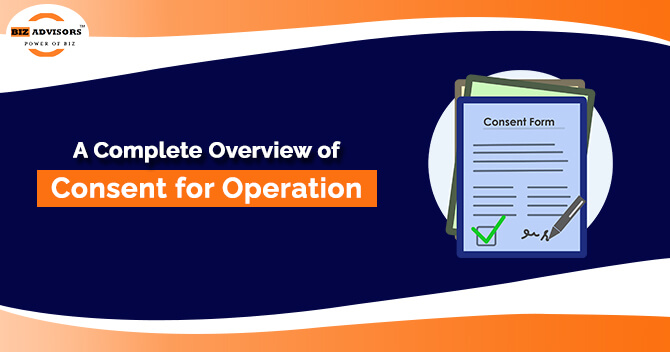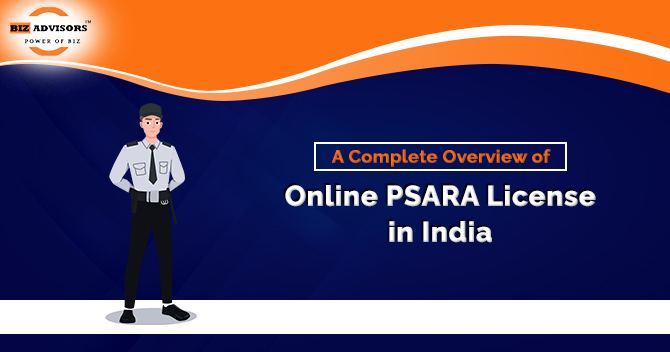Consent for Operation (CFO) comprehensively alludes to the direction of providing valid consent to the structural framework of industrial units for regulating their operational management efficiently. Consent for Operation is required for every pattern of industrial dimensions by the State Pollution Control Board (SPCB) to further its activities on a broad scale. It establishes a smooth and effective network of ecological diversity. Consent for Operation forms a substratum of robust environmental beauty and also delineates an explicit picture concerning firm balance in maintaining the integrity of biological sustainability. It provides a support system to the industrial divisions in trivializing the effect of environmental degradation. It also demonstrates an efficacious environmental sustainability model and helps refurbish the broken chain of environmental justice. Consent for Operation promotes an optimistic approach in the context of elevating the standards of industrial units in following the ideal pattern of environmental welfare. In this blog post, you will learn about the basics concerning the Consent for Operation in a detailed format.
Consent for Operation (CFO)
Industrial units must first receive consent to operate, also referred to as consent for operation (CFO-Air and Water). Businesses with the potential to pollute the air and water are required to apply for this Pollution No Objection Certificate at their local State Pollution Control Board (SPCB) or Pollution Control Committee by sections 25/26 of the Water Act of 1974 and section 21 of the Air Act of 1981. (PCC). Before beginning the planned activities, the industry needs a pre-operation NOC. The green, orange, and red category industries require Permission for Operation (CFO).
Certain State Pollution Control Boards also keep a list of exempted categories (sometimes known as the “white category”) of industries that don’t need permission and can operate wherever in the state in question, provided the local government clears the location first.
The applicant must receive permission to operate (CTO/CFO) for the industrial unit when it has been created and equipped with the necessary pollution control technology. Industrial units must ensure timely NOC renewal and abide by the terms and post-compliances issued by the Board to the specific unit because this consent is granted for a specified period and must be renewed periodically.
Assessment meanwhile Consent for Operation (CFO)
The business owner will apply for CFO after the site construction is finished and he has successfully installed all necessary waste management and pollution abatement equipment by the relevant regulations. The procedure can take up to 30 days. As a result, the unit must consider this time before making the application. In addition, the unit must ensure strict compliance with the regulations governing the release of the pollutants generated by commercial discharge. The ensuing restrictions must be observed.
After exhaust treatment, air emissions from chimneys, exhausts, and vents must be tested by air pollution control devices.
The following contaminants’ PPM concentrations need to be controlled:-
· PM10\s5\s
· NOX
· Wastewater: – Effluent and wastewater outflow needs to be monitored and checked. When conducting a site inspection, certain criteria must be met.
· Oil and grease,
· PH
· TSS
· TDS
· BOD
· COD
· Noise levels: Under the following situations, the Board’s directives must be followed for testing and regulating the facilities ambient and operational noise levels.
· Loudness: During the day (6 AM to 10 PM)
· Night time: (10 PM to 6 AM)
Essential Documentation concerning the Consent for Operation (CFO) under the Air Act
Following are the significant documents in the context of obtaining Consent for Operation (CFO) under the Air Act:
· Although permission is provided for both air and sea operations, the following sections explain the documentation requirements in each situation.
· Indicator/Site Map
· Topo Map
· A diagram that shows the locations of stacks and chimneys as well as the many operations and point sources of emissions in detail
· Flowchart of the Procedure
· Modern analysis report
· Specifications of Air Pollution Control Equipment Offered or Proposed
· Report on Environmental Air Quality (If available)
· The CFE Copy and Implementation for the Specified Conditions
· For chemical businesses, a list of raw materials and their monthly (MT/M) MSDS quantities
Essential Documentation concerning the Consent for Operation (CFO) under the Water Act
· Specifications of provided or projected water pollution control equipment
· A flowchart of a manufacturing process, including captive power generation and the production of dematerialized water, shows the products produced, the inputs used, and the waste that is produced.
· Map showing the site’s location
· Site approval by the local government
· Water use division and water balance. (Process consumption, home use, canteen use, gardening use, boiler use, and other uses)
· Boiler, Steam Generating Certificate showing Tons of Coal Consumed Every Day and Properly Attested by the Office of the Boiler Inspector
· A list of raw minerals with their monthly production rates (MT/M).
· Third-party analytical report from a MOEF-accredited laboratory that includes analyses of wastewater, source samples, and ambient air quality (in case of consent renewal).
Procedure
Before beginning operational activities, the entrepreneur must first get permission to operate from the State Board. This must be done once the unit has been created and the necessary pollution control systems have been installed.
The process concerning the Consent for Operation contains the following stages:-
Step 1: Online application submission and payment of the consent fee via OCMMS
States have adopted the Online Consent Management and Monitoring System (OCCMS) for receiving applications for new Consents to Establish (CTE) and Consents for Operation (CFO), as well as for their renewal, to streamline the Consent management and monitoring mechanism and promote the ease of doing business.
Aside from the Pollution NOC, certain units that handle plastic trash, electronic garbage (E-waste), hazardous waste, biomedical waste, etc. need authorization from the relevant SPCB/PCC. A Consolidated Consent and Authorization (CC&A) is a kind of consent clearance that has been adopted by many states.
Step 2: Review the Application
After carefully reviewing the application, the section officer transmits it to the supervising officer (a senior scientific officer, a scientific officer, or an environmental engineer), who reviews it and, as necessary, provides comments.
Step 3: Site Inspection
The Owner or a representative designated by the Owner must be present when the Inspecting Officer visits the site as scheduled to conduct a thorough inspection of the whole facility.
Based on the results of the sample analysis of the trade effluent and the expert officer’s proposal, an inspection report will be written.
Step 4: Issuing or declining permission for the operation (CFO)
According to the authority delegation in the relevant Pollution Control Board[1], the Consent for Operation will be approved or rejected by the Chairman / Member Secretary based on the recommendations of the inspecting officer and taking into account all of the issues raised at the time of inspection.
Conclusion
The aforementioned text imparts an unambiguous picture concerning the Consent for Operation. Consent for Operation emphatically adjoins the structural framework of environmental law with the ideal pattern of law. It systemizes the operational functioning of the ecosystem in a well-organized format. Consent for Operation provides a successive adjunction of the policies in the context of regulating surcharged environmental sustainability. Our legal luminaries at BizAdvisors.io provide robust support with regards to assisting individuals to easily get services in the context of Consent for Operation to effectively regulate the operational dynamics of an industrial unit. You can freely contact our legal consultants at BizAdvisors.io for any kind of professional assistance or support in the context of the structural framework of the Consent for Operation.
Read our article:A Complete Overview of the Delhi Pollution Control Committee(DPCC)
 9559179325
9559179325 9559179325
9559179325





